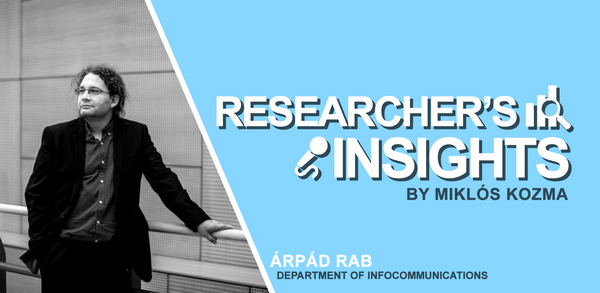Personalized investment advice through a robot’s X-ray vision?

I talked to Árpád Rab associate professor of the Corvinus University of Budapest , researcher of the Infocommunications Institute about a research project involving several departments and companies and dealing with the authenticated evaluation of financial products and services with the aim of offering personalized investment services.
VKE Dorsum, a co-operation between Netmedia and the Corvinus University of Budapest
(VKE 2018) is a major research project (led by Péter Fehér, Trinh Anh Tuan, Michael Puhle and Zsolt Ződi). Árpád Rab who is in charge of a specific research line, accorded us an interview on his specific responsibilities. The challenge for him is to be able to provide artificial-intelligence aided personalized investment advice on the basis of various data without violating the privacy of the subjects. The future service based on the findings of the current research will also benefit people who are not familiar with the world of investments. As for banks and financial intermediaries, the application of the right algorithms will allow them to identify the kind of offer that might be of interest to their existing and future customers. From the viewpoint of banks, the project focuses on marketing and keeping customers.
The question is how to tell which business products each of us views positively from our actions in the digital space.
Árpád Rab’s task in the project relates to this aspect, i.e. profiling. Ordinary people have different approaches to money. The challenge is to find out how an unknown person thinks about the issue, what services and how he or she likes to use judging from his or her previous behaviour. In the first major phase of the work, the researchers will process the data collected among others through online surveys to identify personality types.
Árpád Rab considers this task as a mission for social science
insofar as the discovery of humans’ digital behaviour might lead to revealing a number of major correlations, thus goes way beyond the current narrower research objectives. In fact, the question is how each of us exists in the digital space, how we like to take decisions, how real or malicious we perceive digital space to be, how far we take responsibility for our actions taken in the digital space. As a first key outcome of the project, based on the analysis of financial behaviour, the researchers will identify five to ten personality profiles. The development of the related software and of the AI algorithms is also underway. Later on, a mobile application and an online platform will also become available to support the product.
The scale of the project is larger than that of a classical advisory assignment,
as here during the profiling researchers also reach individuals who are not considering to invest. These persons might finally not be receiving investment offers from the bank, but rather be approached with other types of products like account packages, pension arrangements. Moreover, the researchers envisage creating a business assistant to help individual users take decisions, something that extends far beyond the offers of individual banks. Árpád Rab added that in the developed societies of our age, developments were pointing in this direction.
The partners of the Corvinus Fintech Center will be involved in the scientific and social dissemination of the results,
they will receive them first-hand. Besides creating a business product, researchers representing the university plan to produce new scientific results too, especially in the areas of developing AI algorithms, in taking digital profiling to a new level, in supporting marketing objectives. University staff currently working together in the framework of the project have not been hired by a company, but take part in joint reflection, influence each other’s perceptions, inspire each other. Owing to the effort, a new manner of scientific dialogue is about to emerge among adjacent disciplines represented at the university.
Miklós Kozma
Department of Business Studies
